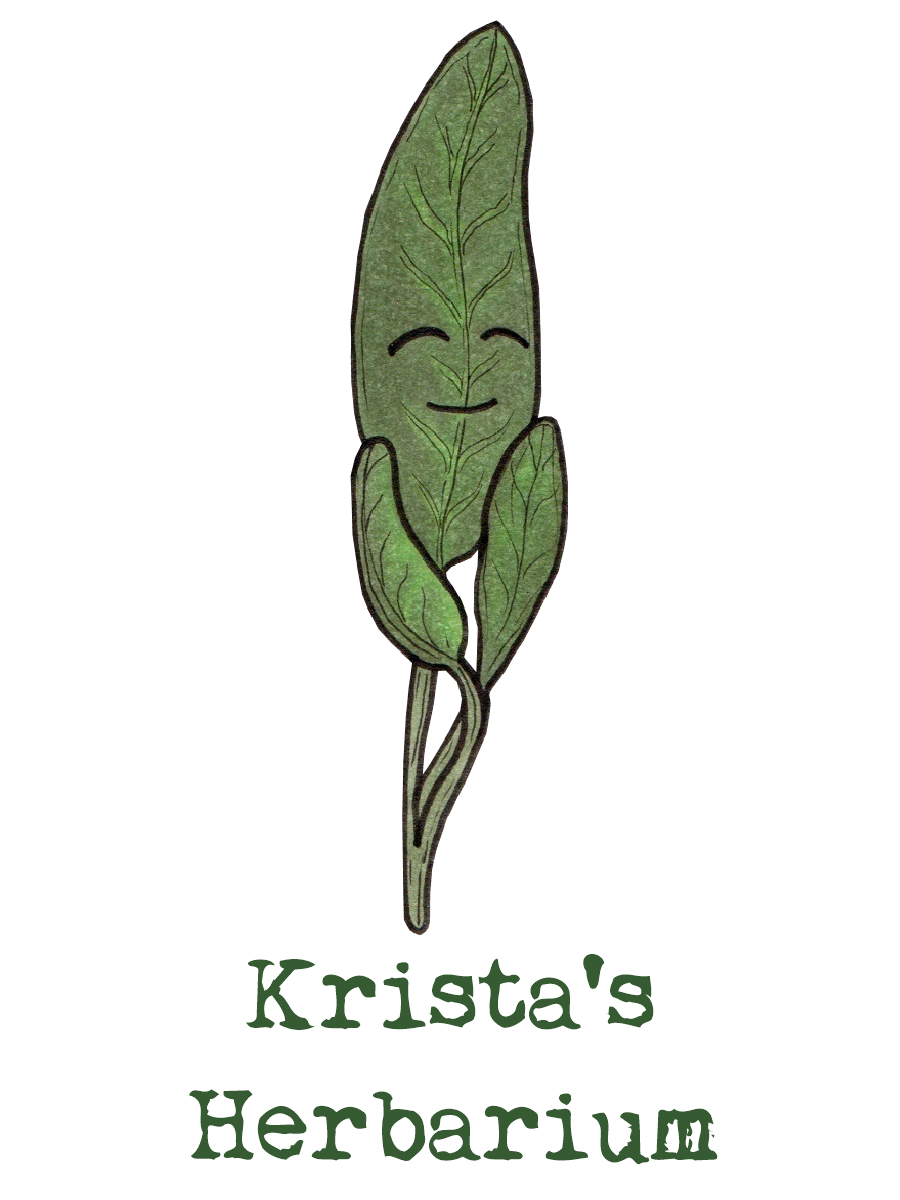Krista's Herbarium
a collection of herbal remedies, recipes, and reveries
Hippocrates and the Oxymel

Oxymel: A Medicinal Drink
2500 years ago, Hippocrates prescribed oxymels, a mixture of honey and vinegar, to relieve acute symptoms of disease, tonify and support the body during stress or times of illness, to clear the respiratory tract and put the Humours in balance.
Hippocrates text, On Regimen In Acute Diseases (400 BCE), gives wisdom and practical help for those battling disease or trying to maintain health.
“[Oxymel] promotes expectoration and freedom of breathing … It also promotes flatulent discharges from the bowels, and is diuretic, but it occasions watery discharges and those resembling scrapings, from the lower part of the intestine, which is sometimes a bad thing in acute diseases, more especially when the flatulence cannot be passed, but rolls backwards; and otherwise it diminishes the strength and makes the extremities cold.”
I keep a variety of oxymels in my refrigerator at all times. They are exceedingly easy to make, and delicious. I infuse them with different herbs for different purposes. When I am sluggish, with a general feeling of malaise, I will take a spoonful of an oxymel as an uplifting tonic. When I am suffering from a cold or flu, especially one that is taking up residence in my respiratory tract, I take an oxymel several times a day in this acute situation.
According to greekmedicine.com
“A common medicinal preparation that dates back to antiquity is Oxymel, which is basically a mixture of honey and vinegar. It has many uses, and is a part of many traditional medicines.
Although Oxymel is basically just honey and vinegar, there are several different methods, or recipes, for preparing it. The simplest method is just to mix together 4 parts honey with 1 part vinegar. Apple cider vinegar is the kind most commonly used.
A more elaborate recipe is to thoroughly mix together one part of vinegar, one part of water and two parts of honey. Then, simmer this mixture down slowly until only about a third of its original volume remains. While you’re boiling the oxymel down, skim off any scum or froth that rises to the surface.
After it’s prepared, a supply of Oxymel is always kept handy for various uses. Mix a spoonful of it into a glass of water for a refreshing medicinal drink that’s both restorative and energizing and a cooling febrifuge, particularly for agues, or intermittent fevers. Gargle with this drink to soothe and heal a sore throat.
Used full strength or in a less diluted form, Oxymel greatly aids in the expectoration of excess phlegm from the lungs and respiratory tract, opens the airways, and makes breathing easier. Oxymel is also used as a base for medicated expectorant syrups, like Vinegar of Squills. Or, it can be mixed into hot expectorant herb teas to enhance their effects.
Dr. D. C. Jarvis authored a bestselling book in 1958 called Folk Medicine in which he touted honey and apple cider vinegar as a panacea or cure-all. He used this ancient Oxymel preparation to treat arthritis, gout, high cholesterol, as a metabolic stimulant to promote weight loss, and for longevity and life extension. “
Oxymel Recipe
- 2/3 part organic apple cider vinegar
- 1/3 part organic local honey (for a sweeter oxymel use 1:1 ratio)
- fresh herbs of your choice
Chop the fresh herbs as finely as possible.
Fill a jar half way with the herbs.
Cover the herbs with honey.
Add the vinegar and cover with a lid.
Shake the jar daily for two weeks minimum.
Strain out the herbs and store in the refrigerator.
Oxymels will keep for a year, refrigerated.
A few herbs to consider when creating oxymels: (thank you The Nerdy Farm Wife)
- Rosemary: Useful for low energy and poor circulation, good for digestion and nerves. Avoid daily use or medicinal levels if pregnant.
- Sage: antifungal, antibacterial, antiviral. Contraindications: dries up milk flow, not for medicinal use by pregnant or nursing women, do not take for an extended amount of time.
- Thyme: for upper respiratory infections, coughs, bronchitis, antiviral and antibacterial
- Oregano: antibacterial, antiviral, useful for upper respiratory infections
- Bee Balm (Monarda): sore throat, antibacterial, helpful for thick congested coughs, fever
- Mint: stomach soothing, digestive aid
- Rose Petals: astringent, anti-inflammatory
- Elder Flowers: specific for sore throats, immune stimulating
- Raspberry Leaves: general tonic for women
- Lemon Peel: can be added for flavor


I was not aware that this common tonic has a name. I just mix vinegar, honey and water, and have not bothered to add herbs.
LikeLike
Let me know if you add herbs. I am curious how you will like it. 🙂
LikeLike